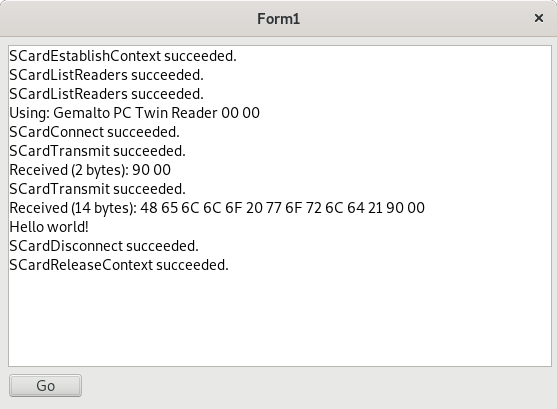PCSC sample in Free Pascal (Lazarus)
Here is a new PCSC sample in Free Pascal language I promised in PC/SC sample in different languages.
Lazarus
From Lazarus web site:What is Lazarus?
Lazarus is a Delphi compatible cross-platform IDE for Rapid Application Development. It has variety of components ready for use and a graphical form designer to easily create complex graphical user interfaces.
Infintuary Pascal PC/SC Sample
I found a Pascal PC/SC Sample code for PCSC with Lazarus at http://infintuary.org/stpcsc.php.This program is also available at https://github.com/ccy/pcsc in a more recent version. Unfortunately the more recent version has Windows specific code and can't be used on GNU/Linux. I reported the issue at Fix build on GNU/Linux: CheckOSError() is for Windows.
License
The license is custom but could be enough. From http://infintuary.org/stpcsc.phpThe Pascal PC/SC Sample is freeware and can be used for any purpose.The terms of use is different from the license available on the github project. For example the terms of use does not explicitly allow modification of the source code, and the use is allowed only for legal purpose. In general it is a bad idea to re-invent a new license text.
By downloading the Pascal PC/SC Sample you agree to the terms of use.
Installation
You copy the files MD_Events.pas, MD_PCSC.pas, MD_PCSCDef.pas, MD_PCSCRaw.pas and MD_Tools.pas.Source code
unit main; {$mode objfpc}{$H+} interface uses Classes, SysUtils, Forms, Controls, Graphics, Dialogs, StdCtrls, MD_PCSCRaw, MD_PCSCDef, MD_Tools; type { TForm1 } TForm1 = class(TForm) Button1: TButton; Memo1: TMemo; procedure Button1Click(Sender: TObject); procedure FormCreate(Sender: TObject); procedure AddLogMemo(Msg: string); private FPCSCRaw: TPCSCRaw; public end; var Form1: TForm1; implementation {$R *.lfm} { TForm1 } procedure TForm1.Button1Click(Sender: TObject); var PCSCResult: Dword; hContext: THandle; SizeReaders: LongWord; pReaders: PChar; hCard: LongInt; dwActiveProtocol: Cardinal; pioSendPCI, pioRecvPCI: pSCardIORequest; inBuffer : TBytes; outBuffer: TBytes; outSize: Cardinal; i: Integer; outString: String; begin FPCSCRaw := TPCSCRaw.Create; FPCSCRaw.Initialize; // Establish context PCSCResult := FPCSCRaw.SCardEstablishContext(SCARD_SCOPE_SYSTEM, nil, nil, hContext); if PCSCResult = SCARD_S_SUCCESS then AddLogMemo('SCardEstablishContext succeeded.') else AddLogMemo('SCardEstablishContext failed: ' + PCSCErrorToString(PCSCResult)); // List readers PCSCResult := FPCSCRaw.SCardListReaders(hContext, nil, nil, SizeReaders); if PCSCResult = SCARD_S_SUCCESS then AddLogMemo('SCardListReaders succeeded.') else AddLogMemo('SCardListReaders failed: ' + PCSCErrorToString(PCSCResult)); GetMem(pReaders, SizeReaders); PCSCResult := FPCSCRaw.SCardListReaders(hContext, nil, pReaders, SizeReaders); if PCSCResult = SCARD_S_SUCCESS then AddLogMemo('SCardListReaders succeeded.') else AddLogMemo('SCardListReaders failed: ' + PCSCErrorToString(PCSCResult)); // Use the first reader AddLogMemo('Using: ' + pReaders); // Connect to the card hCard := -1; dwActiveProtocol := 0; PCSCResult := FPCSCRaw.SCardConnect(hContext, pReaders, SCARD_SHARE_SHARED, SCARD_PROTOCOL_Tx, hCard, dwActiveProtocol); if PCSCResult = SCARD_S_SUCCESS then AddLogMemo('SCardConnect succeeded.') else AddLogMemo('SCardConnect failed: ' + PCSCErrorToString(PCSCResult)); // Send Select Applet command pioRecvPCI := nil; if dwActiveProtocol = SCARD_PROTOCOL_T0 then pioSendPCI := @SCARDPCIT0 else pioSendPCI := @SCARDPCIT1; inBuffer := HexStringToBuffer('00 A4 04 00 0A A0 00 00 00 62 03 01 0C 06 01'); outSize := 258; SetLength(outBuffer, outSize); PCSCResult := FPCSCRaw.SCardTransmit(hCard, pioSendPCI, Pointer(inBuffer), length(inBuffer), pioRecvPCI, Pointer(outBuffer), outSize); if PCSCResult = SCARD_S_SUCCESS then AddLogMemo('SCardTransmit succeeded.') else AddLogMemo('SCardTransmit failed: ' + PCSCErrorToString(PCSCResult)); SetLength(outBuffer, outSize); AddLogMemo('Received (' + IntToStr(outSize) + ' bytes): ' + BufferToHexString(outBuffer)); // Send test command inBuffer := HexStringToBuffer('00 00 00 00'); outSize := 258; SetLength(outBuffer, outSize); PCSCResult := FPCSCRaw.SCardTransmit(hCard, pioSendPCI, Pointer(inBuffer), length(inBuffer), pioRecvPCI, Pointer(outBuffer), outSize); if PCSCResult = SCARD_S_SUCCESS then AddLogMemo('SCardTransmit succeeded.') else AddLogMemo('SCardTransmit failed: ' + PCSCErrorToString(PCSCResult)); SetLength(outBuffer, outSize); AddLogMemo('Received (' + IntToStr(outSize) + ' bytes): ' + BufferToHexString(outBuffer)); outString := ''; for i := 0 to outSize -3 do outString := outString + chr(outBuffer[i]); AddLogMemo(outString); // Disconnect PCSCResult := FPCSCRaw.SCardDisconnect(hCard, SCARD_LEAVE_CARD); if PCSCResult = SCARD_S_SUCCESS then AddLogMemo('SCardDisconnect succeeded.') else AddLogMemo('SCardDisconnect failed: ' + PCSCErrorToString(PCSCResult)); // Release context PCSCResult := FPCSCRaw.SCardReleaseContext(hContext); if PCSCResult = SCARD_S_SUCCESS then AddLogMemo('SCardReleaseContext succeeded.') else AddLogMemo('SCardReleaseContext failed: ' + PCSCErrorToString(PCSCResult)); end; procedure TForm1.FormCreate(Sender: TObject); begin Memo1.Clear; end; procedure TForm1.AddLogMemo(Msg: string); begin Memo1.Lines.Add(Msg); end; end.
Remarks
You will have to create a Form with a TMemo widget and a TButton widget. This part of the solution is not described here.You click on the button and the program executes.
Output
Comments
High level API
I used the low level API provided in file MD_PCSCRaw.pas. These are direct equivalent of the WinSCard API. But a higher level API is also available and is provided in the file MD_PCSC.pas.Unfortunately I was not able to find a way to get the list of connected readers with the high level API. Maybe I missed something (I am very new to Free Pascal). I reported the issue at make TPCSC.GetPCSCReaderList() a public method.
64-bits and GNU/Linux issue
A much more important issue is that this wrapper does not work on a 64-bits GNU/Linux system. I had to install a Debian system on a i386 CPU to write and test my code.The problem is that the wrapper uses a Free Pascal type
THandle to store the SCARDCONTEXT and SCARDHANDLE types. The problem is that a THandle in 32-bits on a 64-bits CPU but SCARDCONTEXT and SCARDHANDLE are 64-bits types on a 64-bits CPU using GNU/Linux.The problem comes from the definition of
long (DWORD) on a 64-bits CPU. On GNU/Linux a long is 64-bits. But on Windows a long is 32-bits only. If you want to have a 64-bits variable on Windows you need to use the long long type. This is because Linux is LP64 and Windows is LLP64. See 64-bit data models for more details.The wrapper should work on macOS even on a 64-bits CPU. This is because Apple does not use any
DWORD in the WinSCard API but int32_t instead.I reported the problem at Using THandle for SCARDCONTEXT and SCARDHANDLE is wrong on GNU/Linux.
Windows only?
As I already wrote in the introduction the, more recent, code available at https://github.com/ccy/pcsc is for Windows only. Some work is needed to make it available (again) for macOS and GNU/Linux.Conclusion
If you use the Free Pascal language and you use Windows then this wrapper can help you.If your system is not Windows or you want portability on diffrent systems then this wrapper may not be a good choice.
